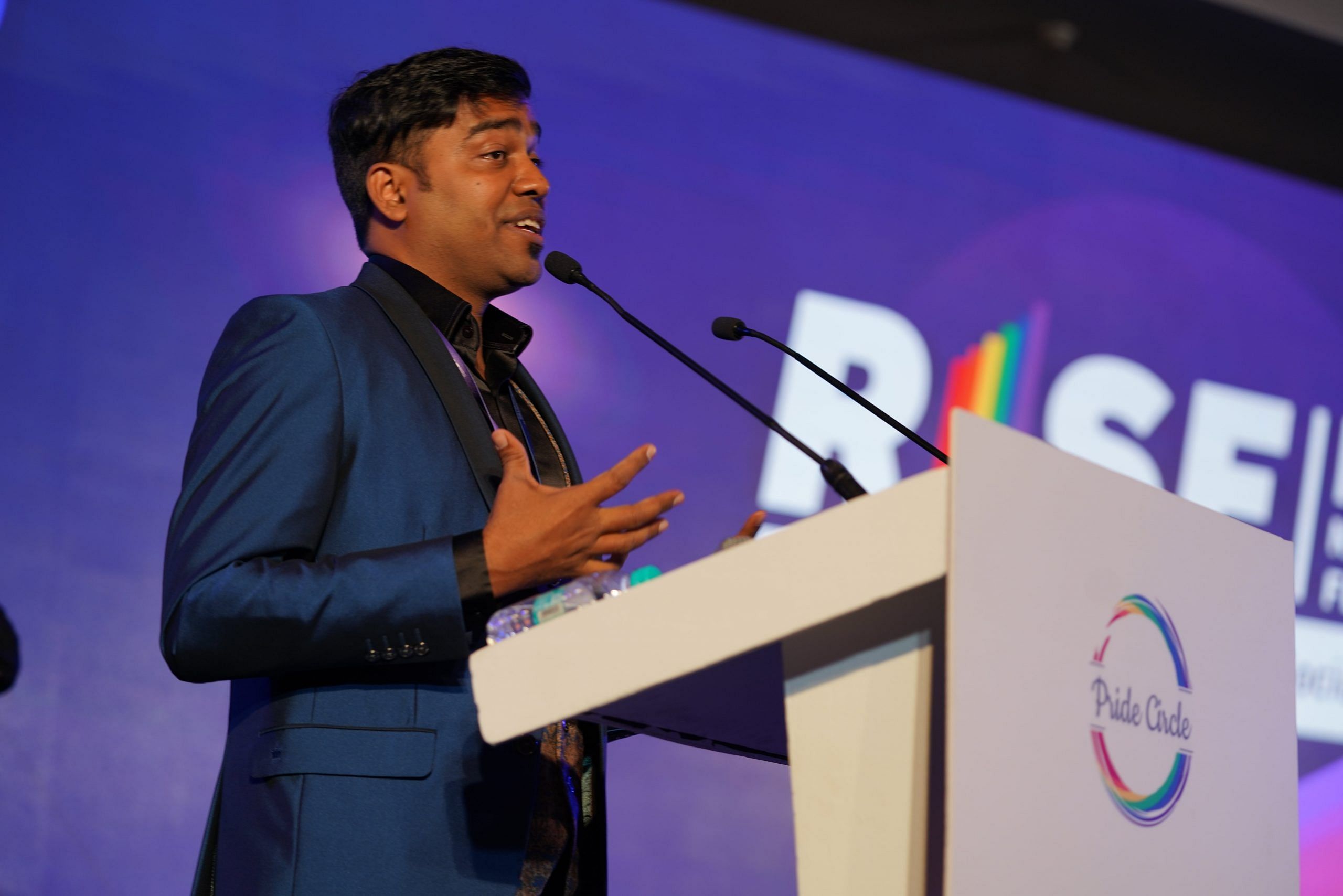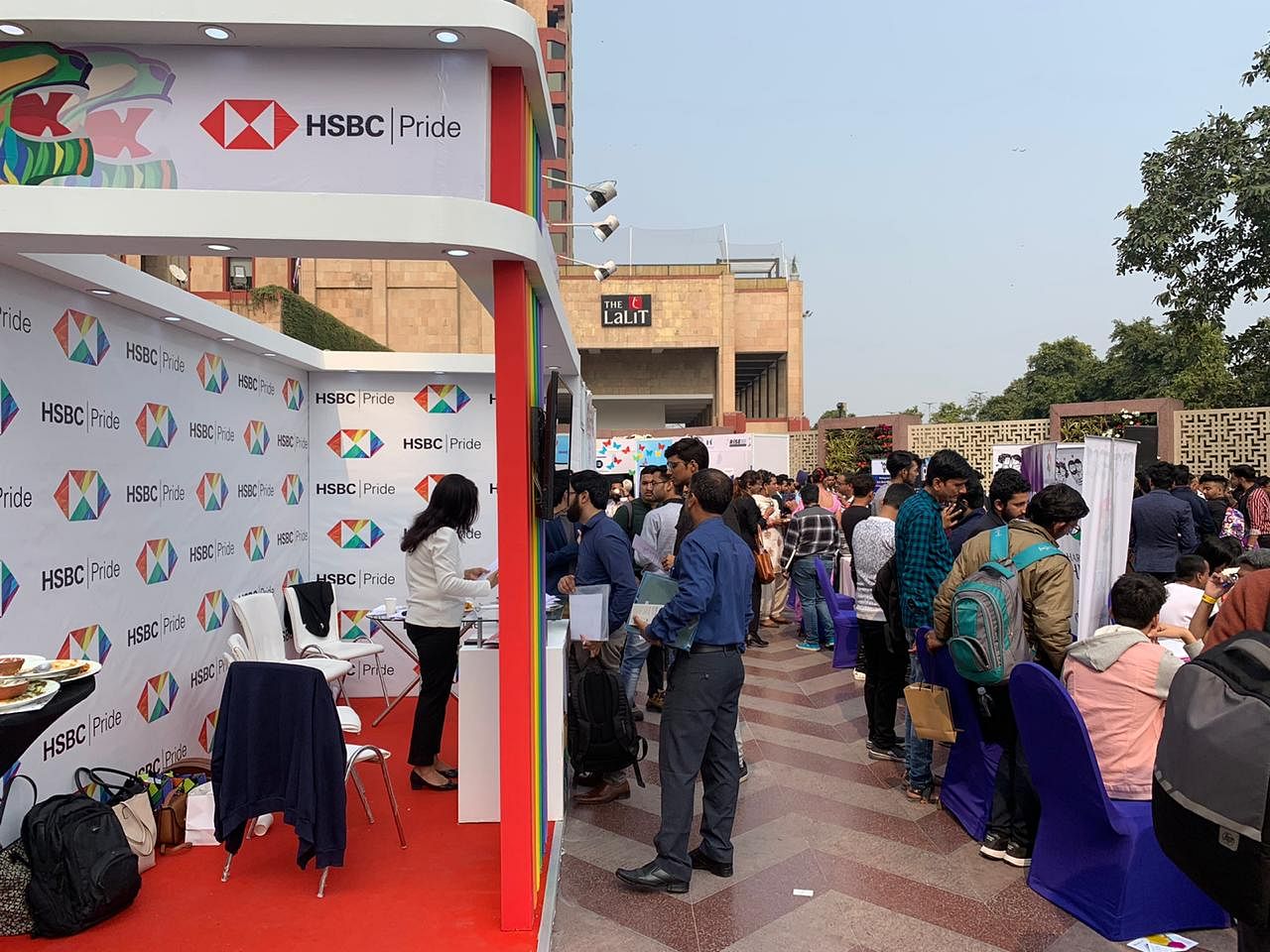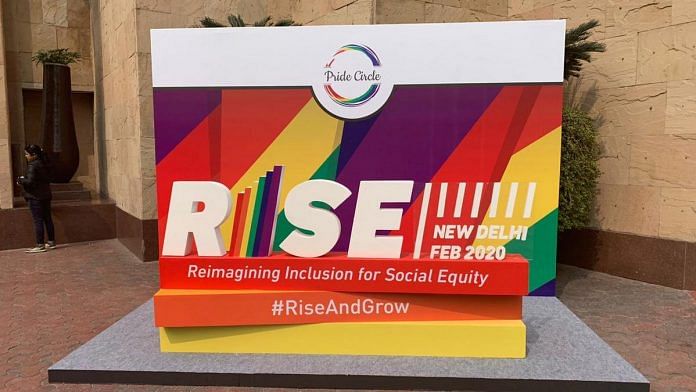New Delhi: In a post-Section 377 world, it would be easy to think that LGBTQ+ folk have now finally found a place in the mainstream. In popular culture, for example, Bollywood just released the same-sex romantic drama Shubh Mangal Zyada Saavdhan, and there is notable uptick of non-straight or non-cisgender roles as seen in web series like Made in Heaven or Sacred Games. But any member from the community will tell you that things are not quite so simple.
According to Ramkrishna Sinha and Srini Ramaswamy of Bengaluru-based consultancy Pride Circle, even today, only one or two people in most big companies across India are out. For them, it’s about time that people no longer have to choose between their identity and their career because, as Sinha says, “it takes so much bandwidth to try and fit in by hiding who you are”.
This is precisely why they created RISE (Reimagining Inclusion for Social Equity), a LGBTQ+ job fair that held its second edition in New Delhi this past weekend at The Lalit, which saw more than 1,000 participants. Rainbow standees, name tags that spelled out the appropriate pronouns to use for people and stalls of corporate bigwigs like HSBC stood side by side with NGOs like the Naz Foundation — it was unlike any regular job convention.
Apart from providing a level playing field for skilled and unskilled job-seekers, the idea was to bring together members of the community, the corporate sector, NGOs and public institutions. But Ramaswamy, who has years of experience in the corporate world’s diversity and inclusion space, squarely points out that allyship is not about charity. “There’s a big business angle to inclusion, and we want companies to tap into a sizeable pink economy.”

Also read: Shubh Mangal Zyada Saavdhan review: Perfect primer for Indians to talk about homosexuality
Pride Circle to RISE
The first edition of RISE, held in Bengaluru in 2019, saw more than 300 applicants and resulted in 43 job offers from several top MNCs . But it was only after years of building a community, and understanding the challenges and discimination faced both by LGBTQ+ people and companies who didn’t have a clue about how to create diversity-oriented policies, that one of India’s first LGBTQ+ job fairs could be created. “By building a community first, we began to understand on-ground challenges, and then got clues on how to skill build for the community. It was then logical for us to build an aggregator platform bringing together supply and demand,” Sinha tells ThePrint.
What began as a WhatsApp group with four members, Pride Circle has now grown to a multi-city network of more than 3,000 people and 150 companies. It operates as a forum for individuals and company officials to come together and discuss professional and personal challenges, and has worked with big names like Goldman Sachs, Intel and Ford to run sensitisation programs, instate policy reviews, encourage gender neutral-language in offices and strategise on how to engage the larger employee base to learn how to interact with LGTBQ+ people.
For Sinha and Ramaswamy, who started their work in 2015, when Section 377 had not yet been read down by the Supreme Court, it was of paramount importance to create a safe space for people to come and get professional advice on how to talk to their managers about salary hikes, how to talk to colleagues and even their families. Discrimination against LGBTQ+ people in the workplace is very real, they point out, referring to a MINGLE report that states that 40 per cent face harassment at workplace, which can take the form of homophobic comments, jokes, harassment from HR or managers and even pay disparity.
“It is common for LGTBQ+ people to face discrimination while seeking jobs. We once heard of an incident when a man was dismissed from a job interview when he revealed his sexual orientation. Then there was a case few months ago when a 25-year-old MBA grad committed suicide on account of being repeatedly teased and harassed by co-workers for being gay.”
The job fair, then, hopes to provide a level playing field for people to be hired based on their skill sets, not their gender or sexual orientation. In the space of corporate diversity, Ramaswamy has seen the conversation move from women’s empowerment to disability access and now finally LGBTQ+ inclusion, and understands the gaps in how companies approach the issue. This is why two years ago, he and Sinha quit their cushy corporate jobs to focus on Pride Circle full time, pouring in all their savings and bootstrapped the venture themselves.

Also read: Fear of anti-CAA protest pushes Mumbai Pride Parade out of 11-year-old venue
Getting people on board
Companies may not be averse to the broader principle of a diverse workplace, but their interest really is piqued when they learn about the actual business end of inclusion and the colossal costs of exclusion. A 2014 World Bank report estimated that homophobia cost India over $30 billion dollars annually. The report pointed out that 56 per cent of white-collar LGBTQ+ workers reported discrimination and not only did homophobia result in lower productivity, but also poorer health, shorter lives and lower labour force participation that led to overall lower economic output in what could otherwise be a flourishing pink economy.
After the archaic Section 377 was read down in 2018’s landmark verdict, companies have become more responsive. “Many companies who were earlier worried about the legality of 377 are now more willing to engage and look to provide same-sex partners benefits, transition insurance for trans employees and organise Pride events for their employees”.
At RISE this year, 20 top-line companies, including HSBC, Accenture, American Express and Uber, and close to 600 attendees for the job fair, apart from about 46 eminent national and international speakers who shed light on which companies are getting it right and how. “By bringing out stories of people like the COO of HSBC Singapore, who is an out-of-the-closet gay man, or the VP of Citibank, who is a trans woman, we wish to inspire people, but also prove that identities and careers don’t have to be binary separates,” says Sinha.
There was also a marketplace that showcased many businesses run by those from the queer community, which were provided mentoring sessions and a chance to interact with potential investors and vendors.
Pride Circle, and RISE’s host the Keshav Suri Foundation, are also working closely with UK-based LGBTQ+ rights NGO Stonewall to develop a Workplace Equality Index, that will act as metric for companies to ensure they’re doing enough for inclusion. The Index will be adapted from the UK-based one, which currently has more than 800 companies onboard. It will be a “tool of accountability,” Stonewall’s Global Director, Leanne MacMillan, tells ThePrint.
A slow road to inclusion
If last year’s job fair offered any lessons, it was probably that the road to inclusion is much rockier than it looks. Sonal, a trans woman who travelled to Bengaluru for the fair all the way from Bhubaneswar, approached companies like Accenture, Paypal, Nielsen, but in the final round of her Accenture interviews, it was her lack of confidence and communication skills that held her back. She did, however, finally score a job with an MNC in Bengaluru called [24]7.ai, who provided her training on the job.
While companies have largely been responsive to logistical problems (Sonal’s HR department helped her find an affordable place to rent after she faced discrimination by landlords, and had gender-neutral washrooms installed in the office merely two days after she joined), the issue of lack of confidence is recurring. Even at this year’s fair, many participants that ThePrint spoke to were nervous about approaching companies after previous such experiences having gone badly.
“Many members of the community have social sector/NGO backgrounds, but we help them in their transition to corporate sectors. For trans people, especially, corporate spaces can be intimidating. We try to help them build confidence,” says Ramaswamy.
In an attempt to skill build within the community, Pride Circle has organised career counselling and LinkedIn workshops on how to build sharper resumes and interview skills. Sinha explains that working with trans people, especially, is a different experience as due their history of violence, trauma and the stigma they have lived with, they have to work that much harder to gain self-confidence.
Anaika, a trans woman from Lucknow who attended RISE this year, tells ThePrint that she had earlier attended another LGTBQ+ job fair organised by a group called Q-rious, also at The Lalit, but she was very nervous then. But she’s back this year, with determination to score a management level job. As a trans woman who had been harassed for several months at her previous job, she liked that she did not have to worry about her appearance or dress while preparing for RISE. “Outside, we get judged, but it’s more comfortable here. It’s like a homecoming.”
Also read: In Pictures: Delhi Queer Pride Parade takes on Transgender Bill 2019



